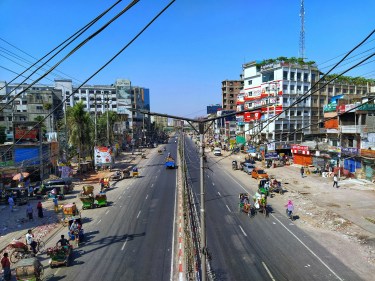
Communal tensions have intensified in Bangladesh following the arrest and subsequent denial of bail for Hindu religious leader Chinmoy Krishna Das, leading to violent protests and raising concerns about the safety of religious minorities in the Muslim-majority nation.
Das, a former member of the International Society for Krishna Consciousness (ISKCON) and current spokesperson for the Bangladesh Sammilit Sanatan Jagran Jote, was arrested at Dhaka airport on charges of sedition on November 25. The charges stem from an October rally where he allegedly disrespected Bangladesh’s national flag by hoisting a saffron flag above it, an act authorities claim showed contempt for the country's sovereignty.
The situation escalated dramatically after Das was denied bail on Tuesday, resulting in clashes between his supporters and security forces in Chittagong. During these confrontations, a Muslim lawyer, Saiful Islam Alif, was killed. The violence spread further on Friday when a mob attacked three Hindu temples in Chittagong’s Harish Chandra Munsef Lane, including the Shantaneshwari Matri Temple, Shani Temple, and Shantaneshwari Kalibari Temple.
The religious unrest has prompted Bangladesh's financial intelligence unit to freeze the bank accounts of 17 individuals allegedly connected to ISKCON Bangladesh, including Das, for 30 days. Meanwhile, far-right groups such as Hefazat-e-Islam Bangladesh have called for a complete ban on ISKCON, labelling it an “extremist” organisation. However, the Bangladesh Supreme Court dismissed a petition seeking such a ban.
The turmoil occurs against a backdrop of broader political change in Bangladesh. Since Prime Minister Sheikh Hasina was ousted in August following student-led protests, religious minorities have reported an alarming surge in violence. According to the Bangladesh Hindu Buddhist Christian Unity Council, there have been 2,010 incidents of attacks against minorities, affecting 1,705 families across all 64 districts of the country.
The situation has strained diplomatic relations between Bangladesh and India. Indian External Affairs Minister S Jaishankar told Parliament that New Delhi has taken serious note of the violence against minorities. The Ministry of External Affairs expressed concern about the “surge of extremist rhetoric” and increasing incidents of violence, calling on Bangladesh’s interim government to “live up to its responsibility of protecting all minorities.”
The controversy has also affected Indo-Bangladesh relations at the community level. In Kolkata, JN Ray Hospital announced it would no longer admit Bangladeshi patients, citing disrespect shown towards the Indian flag by Bangladeshi citizens.
ISKCON Bangladesh has distanced itself from Das, stating he was expelled from the organisation in July for disciplinary issues. However, both the Bangladesh and Global ISKCON chapters have condemned his arrest.
The interim government, led by Nobel laureate Muhammad Yunus, has defended its position. Shafiqul Alam, press secretary of Bangladesh’s chief adviser, emphasised the government’s commitment to religious freedom while suggesting that some incidents reported in Indian media have been exaggerated.
The situation remains volatile as Bangladesh grapples with constitutional reforms. The interim government has established a commission to consider whether to rewrite or amend the constitution, with particular attention to the status of secularism as a state principle. The commission is expected to submit its report by December 31, after which the government plans to conduct consultations with political parties to build consensus on the way forward.
As protests continue across major cities including Dhaka, Chattogram, and Rampur, religious minority leaders are advocating for eight key reforms, including provisions for religious festivities, investigations into reported atrocities, and protection of religious sites.




